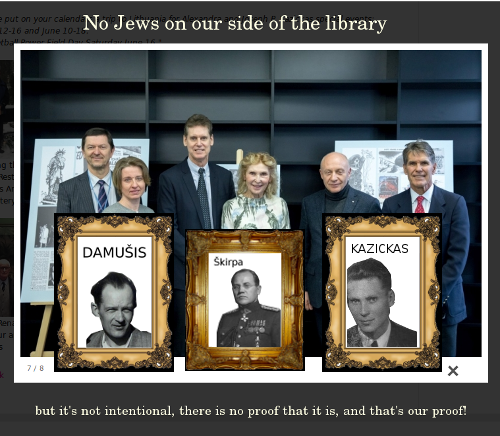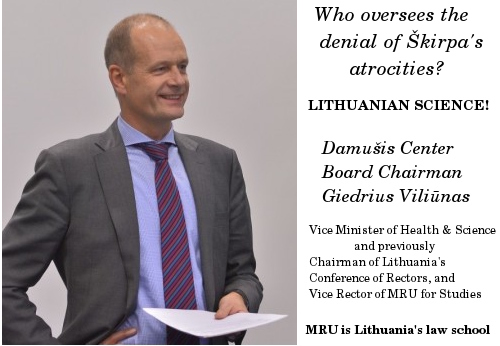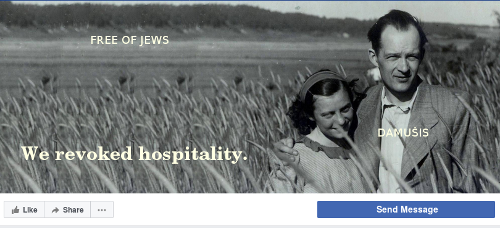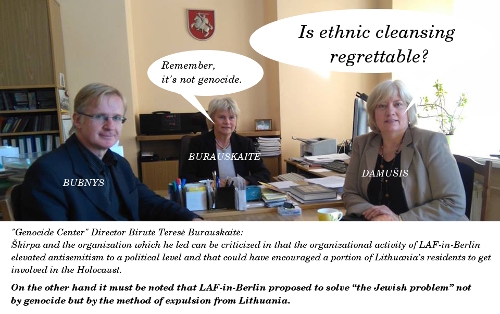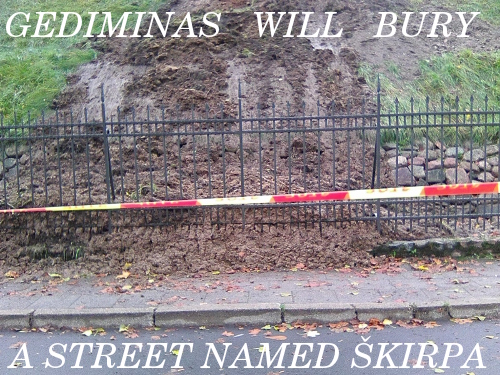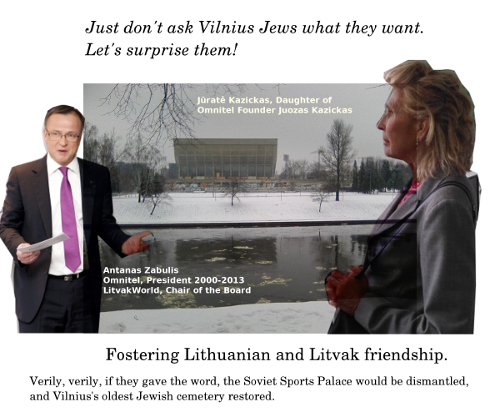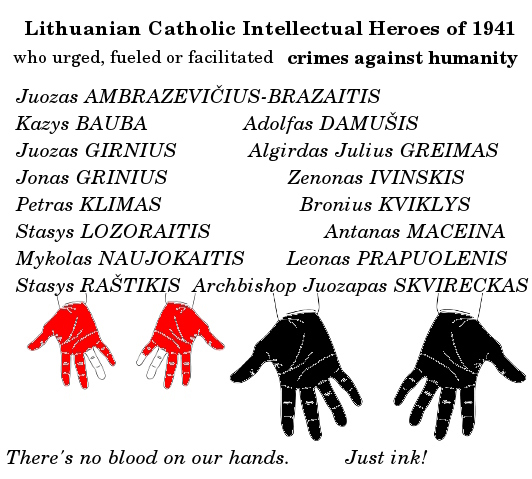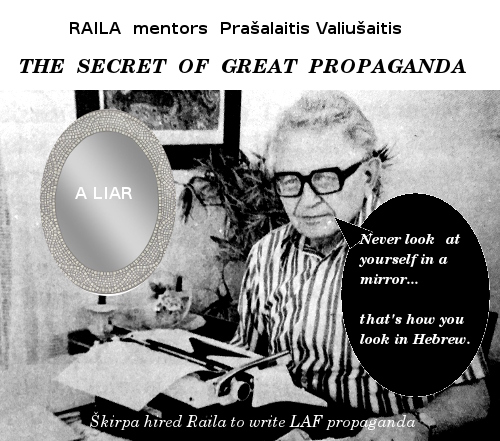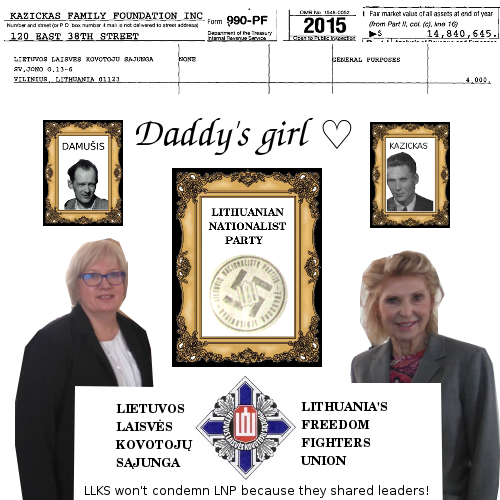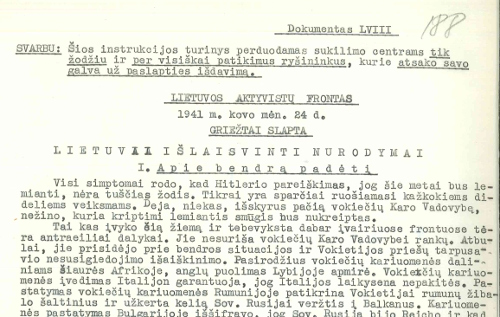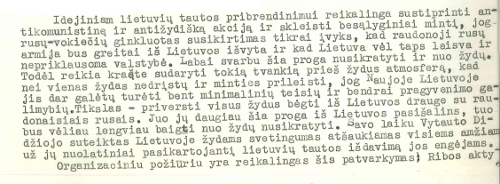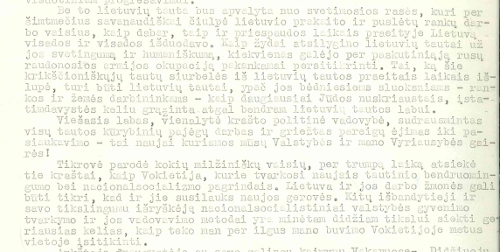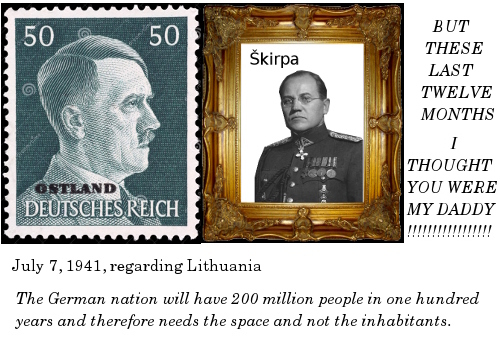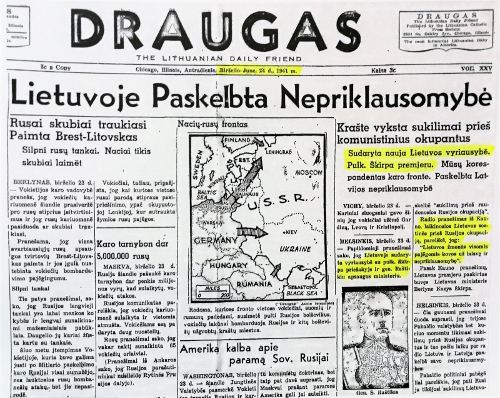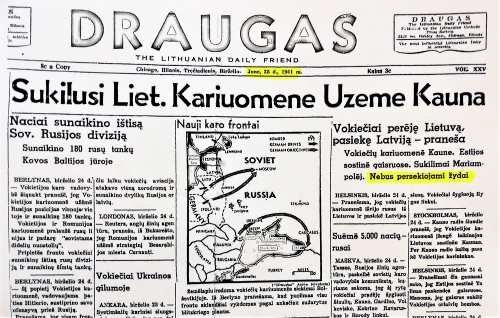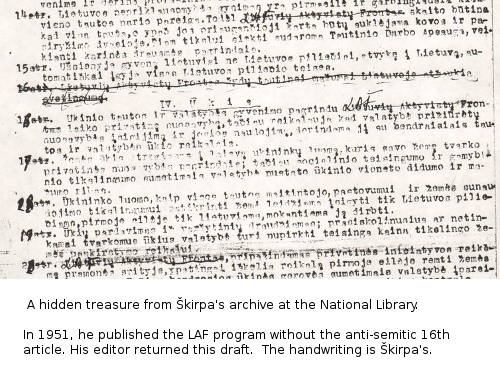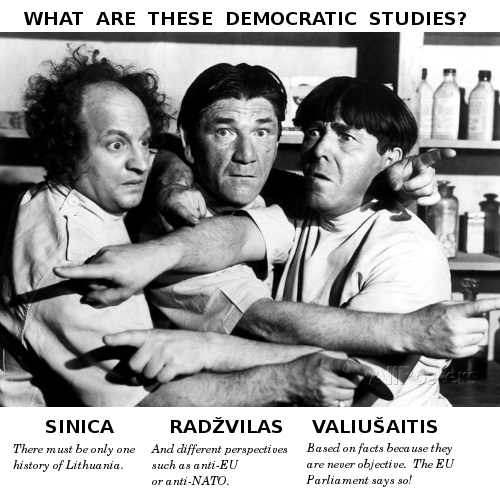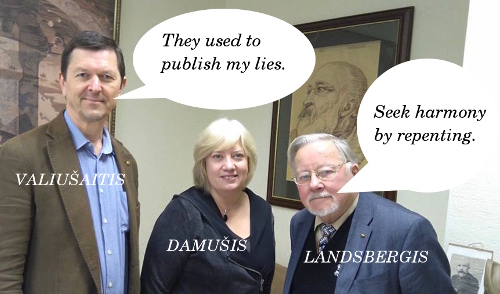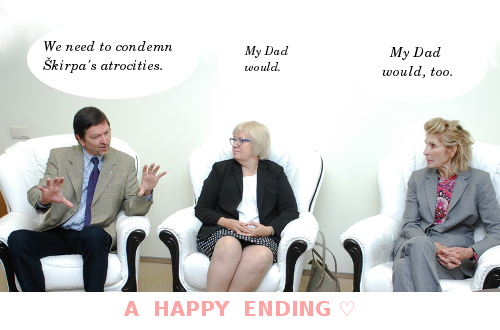OPINION | HISTORY | COLLABORATORS GLORIFIED | CHRISTIAN-JEWISH RELATIONS | LITVAK AFFAIRS
◊
by Andrius Kulikauskas
◊
Lithuania’s Mažvydas National Library is curiously fostering two parallel cultures which have yet to engage each other. Up on the fifth floor, on the West side, an eminent Judaic studies scholar leads the Judaica Research Center (cosponsored by the Yivo institute in New York), and on the East side, journalist Vidmantas Valiušaitis leads the Adolfas Damušis Democracy Studies Center.
More on Mažvydas National Library; on Yivo’s history in Vilnius since 2011
Tuesday, February 13, 17:30, on the second floor, the Library will present Valiušaitis’s latest book, “A Lady from a Venetian Tavern. ‘Our People’ and Other Passersby In Their Very Own History”. („Ponia iš Venecijos tavernos. „Mūsiškiai“ ir kiti prašalaičiai savojoje istorijoje“.) The very title of his book refers to “Mūsiškiai” (“Our People”), the Lithuanian best seller by Rūta Vanagaitė, in which she publicized uncomfortable truths about the widespread participation of Lithuanians in conducting the Holocaust. Valiušaitis’s word “prašalaičiai” may mean passers by, vagabonds, foreigners or those who are not family.
In the last few years, Valiušaitis has taken an ever more strident stand in defending Kazys Škirpa from charges of antisemitism. Škirpa was the leader of the Lithuanian Activist Front (LAF) and the organizer of the 1941 anti-Soviet rebellion. In September, 2015, Valiušaitis bragged in a leading Lithuanian cultural magazine, Kultūros Barai, that he was the first person from Lithuania to research the Škirpa archive at the American Lithuanian Cultural Archive (ALKA) in Putnam, Connecticut. Valiušaitis professed amazement that historians had not examined the primary sources. And he definitively asserted, “I have not read any antisemitic pronouncements by him, neither in his public writings, nor in his private correspondence.”
This was a strange but telling statement given that historian Saulius Sužiedėlis had stunned the Lithuanian diaspora in 1991 with his revelations that Škirpa had evidently whitewashed key LAF documents which he had published in his 1973 memoirs. Sužiedėlis discovered Škirpa’s original, antisemitic documents in the Turauskas archive at the Hoover Institute. Indeed, Škirpa’s original 273 page memoir, written during World War II, along with 110 accompanying documents, can be found in Lithuania at the archives of diplomats Bronius Kazys Balutis, who served in the United Kingdom, (LCVA f.648, a.2, b.581-582), and Albertas Gerutis, who served in Switzerland (VUB RS f.155, a.310). Defending History has made them available. About 20 of the 110 documents urge ethnic cleansing of all Jews from Lithuania.
On March 15, 2016, at Vilnius University Institute of International Relations and Political Science, Valiušaitis gave a lecture entitled, “Lithuania and ‘our people’ during the Holocaust: What determined the catastrophe of 1940-1941?” He spoke as the leader of the Adolfas Damušis Democracy Studies Center. He criticized Vanagaitė’s book for casting all Lithuanians in the same light. Instead, Valiušaitis argued that those who collaborated with the Nazis were not “our people” and not worthy of the name of Lithuanians. But we must not let that tarnish the names of model heroes such as Adolfas Damušis and other anti-Soviet rebels of 1941.
I personally attended that lecture. Indeed, I wrote beforehand to Valiušaitis and the Center’s founder, Damušis’s daughter, Lithuania’s ambassador Gintė Damušis, to inform them about Škirpa’s original memoirs. I also alerted them that Damušis himself, along with other leaders of LAF, had signed Prapuolenis’s final speech to the Nazi civil authorities, soon after which Prapuolenis was arrested. And that speech included a politely worded call for ethnic cleansing: “LAF revokes hospitality from the Jewish ethnic minority in Lithuania.” The strange formulation acknowledged that Lithuania’s Jews had been welcome since they were invited by Grand Dukes Vytautas and Gediminas. The words, like so much of Prapuolenis’s speech, were taken verbatim from the LAF program in Berlin which philosopher Antanas Maceina wrote and Škirpa and Valiukėnas edited. The speech was published at the height of the Holocaust by “Išlaisvintas Panevėžietis” with a circulation of perhaps 15,000. Which is to say that although Adolfas Damušis was highly esteemed as a student leader who had been jailed by Smetona, and then later by the Nazis, but even he had signed an antisemitic document plagiarized from Škirpa’s collection. Was Damušis not “our people”?
It took some courage, empathy and politeness to stand up to a room of young Lithuanian patriots led by Vytautas Sinica. There and then I asked Ambassador Damušis if she might regret that her father had signed such a document. She couldn’t say the word that he might have said if he was still alive. She claimed that such revelations were harmful to Ukraine’s cause as it stood up to Russia. I took the opposite point of view. But I also consistently thanked Valiušaitis for his interviews of Kazys Bobelis about his father Jurgis Bobelis, the Kaunas Military Commander, and how he was overthrown by Jonas Pyragius and the Voldemarists because he kept them from harming Jews. Valiušaitis’s invaluable research is collected in his 2013 book, “Let Us Speak and Hear Others: History’s Tragic Years of 1940-1941”. The next day, Valiušaitis wrote a letter in which he said that he would study the documents I alerted him to. He also noted the history of his own family.
…before the war, the Valiušaičiai experienced much good from Jews, and thus extended their right hand to Jews in a difficult hour for them. My uncle’s family has been awarded ‘The Cross for Rescuing the Dying’ for saving Jews.
However, in November 2016, when Vilnius City Council member Mark Adam Harold organized a public discussion, Valiušaitis defended Škirpa as innocent. “Guilty Without Guilt: Today Škirpa, Tomorrow Basanavičius?” he wrote in the Catholic portal Bernardinai. He developed a grab bag of propaganda techniques. He ignored the simple truth – Škirpa’s documents – and instead created enemies and pounced on them.
What happened? The purpose of the Adolfas Damušis Democracy Studies Center is to promote research about the development of twentieth century democratic political thought in Lithuania with a focus on civic engagement and resistance to authoritarianism and totalitarianism. The Center is presumably funded by Lithuanian Americans who cherish a narrative of the 1941 rebellion where young Catholic Lithuanian activists were model heroes who stood up to Smetona’s autocratic regime, the Soviet Union and Nazi Germany. It may well be funded by the Kazickas Family Foundation, which was founded by LAF rebel Juozas Kazickas, the founder of Omnitel, and is directed by his daughter Jūratė Kazickas. On June 13, 2016, at the invitation of Ambassador Damušis, Jūratė Kazickas visited the Damušis Democracy Studies Center at Mykolas Romeris University, where she met with Rector prof. Algirdas Monkevicius and MRU Senate President prof. Gintaras Aleknonis.
On February 2, 2018, Jūratė Kazickas shared news about her most recent visit to Lithuania. She and her brothers Michael and John met with representatives of Litvak World to discuss ideas for the future of the Great Synagogue. Then they met with Vidmantas Valiušaitis at the National Library.
We visited the National Library for discussions about an event on June14-15. They are sponsoring a political conference that will include a lecture on the critical role the diaspora played for decades to help Lithuania on its path towards independence in 1991, highlighting the efforts of Joseph P. Kazickas, along with Lithuanian American activists Kazys Ambrozaitis, and Adolfas Damusis. We are planning some displays of Joseph P. Kazickas memorabilia, letters and speeches, as well as a slide show or video of his life.
On June 15-16, 2017, the Martynas Mažvydas National Library celebrated the opening of the Adolfas Damušis Democratic Studies Center with a two day conference of “Political Studies”. Archbishop Gintaras Grušas gave the invocation. Sinica spoke about “Our own shot our own: Who is writing Lithuania’s history?” Valiušaitis spoke about “The knot of Lithuania’s historical drama: 1940-1941” A round table discussion considered the legacy of Škirpa and Damušis without including any Jewish voices on that matter.
On September 1-4, 2017, in the US, at the study weekend of the Catholic youth movement Ateitininkai (Futurists), Valiušaitis spoke about the need to always be ready to search for truth based on historical facts. Unfortunately, they are not learning the truth that Juozas Ambrazevičius-Brazaitis, Zenonas Ivinskis, Jonas Grinius, Kazys Bauba, Stasys Raštikis, Antanas Maceina, Juozas Girnius, Archbishop Juozapas Skvireckas, Leonas Prapuolenis and Adolfas Damušis all contributed, as Catholic intellectuals, spiritual leaders, authors, editors or activists, to crimes against humanity against Lithuania’s Jews.
Valiušaitis grew most extreme in his December 4, 2017 article for Delfi: “Regarding Škirpa – the Truth is Otherwise, Mister Mayor”. He berated Vilnius Mayor Remigijus Šimašius for shifting his position on Škirpa. Šimašius was now saying:
On the one hand, K. Škirpa was the first volunteer, who raised the tricolor on the castle of Gediminas, and on the other hand, he urged getting rid of Jews. I am not inclined to assent that people who made such statements should be honored by a street in their name.
Valiušaitis replied:
But the truth is otherwise. Neither K. Škirpa’s merits to Lithuania are limited to the raising of the tricolor on the Gediminas castle tower, nor did K. Škirpa urge “getting rid of the Jews”, as the Mayor interprets that.
And he concludes with a warning to the Mayor:
Remigijus Šimašius should not forget that his judgements will also be judged. And accordingly will be judged, among whom he will himself be placed.
On December 6, 2017, Pro Patria, led by Vytautas Sinica, published a declaration by The Lithuanian Freedom Fighters Association (LFFA), “Hands Off the Signs Commemorating Kazys Škirpa!” The LFFA received donations of $4,000 from the Kazickas Family Foundation in 2013 and 2015.
Recently the media, as if savoring self-deprecation, publishes ever new articles, how Lithuanians collaborated with Nazis, how they betrayed and killed Jews, how they plundered their property. It must be known, that these thieves were not nationalists… Recently news, interviews and reports were actively publicized about “a global gathering” at Molėtai, remembering how Lithuanians (of Molėtai) murdered and annihilated Jews. … If there continue to be similar “gatherings”, and yet again reports about events, to which will come together, as if to a zoo, to observe never-before-seen degenerates who shot Jews, then there may well again be antisemitic comments from hired trolls and non-trolls, and the antisemitic kitchen be provoked again.
The growing campaign to blame Lithuanians as Jew-shooters is fruitless. It only sows discord, provokes antisemitism. … On their part, no blame of their own criminals, only – “I’m not guilty.” But they don’t apply this principle to Lithuanians… Lithuanians are forgiving and patient, but will not tolerate maliciously incited hysteria and the slander of the innocent majority of the nation and its heroes, so that the thought wouldn’t gnaw the hearts of our descendants that a Jew is a slanderer and reckless accuser of the innocent.
The Genocide and Resistance Research Centre of Lithuania, and individual investigators in the United States investigated K. Škirpa’s archive, read his letters and many of his articles. And they did not find anything similar to a disposition against Jews or any other nation.
The fact is that K. Škirpa’s most important document was his “Instructions for Liberating Lithuania” dated March 24, 1941. He kept it in his personal safe in Berlin so that the Nazis would not discover it, for he described how Lithuania would declare independence even if the Nazis disapproved. It was so secret that he would not give a copy to Mykolas Naujokaitis, but made him memorize it. On pages 7-8 he writes:
For the ideological maturity of the Lithuanian nation it is necessary to strengthen anti-Communist and anti-Jewish actions and to unconditionally spread the idea that the Russian-German armed conflict will truly happen, the Red Army will be quickly driven from Lithuania and that Lithuania will become a free and independent state. It is very important at this opportunity to also get rid of the Jews. Therefore we need to create in the land such a muggy atmosphere against the Jews that not a single Jew would dare to even allow themselves the thought that in New Lithuania they might still have even minimal rights and any sort of possibilities for making a living. The purpose is to force all of the Jews to run from Lithuania along with the Red Russians. The more of them remove themselves at this time, the easier it will be to finish ridding ourselves of Jews. The hospitality which Vytautas the Great granted in Lithuania to the Jews is revoked for all ages for their perpetually recurring betrayal of the Lithuanian nation to its oppressors.
From an organizational perspective this order is necessary: within the bounds of the activist movement, as the manifestor and executor of the political will of the Lithuanian nation, must be formed the National Work Defense, [Tautinio Darbo Apsauga], as the fighting organ of that movement. It must be made of completely reliable men, able to wield arms and determined, if there be need, to sacrifice their own life for Lithuania and the ideals of the activist movement. …
Because the general attitude of the residents is strictly anti-Communist and anti-Jewish and because the Soviet terror has verily pushed people to take up arms, then it seems that there is no reason for each fighting unit to consist of many members.
◊
We can go back even to K. Škirpa’s first mention of ethnic cleansing in Document 34, which he showed to Nazi party analyst on July 13, 1940. Lithuania wasn’t even part of the Soviet Union then. Škirpa was hoping the Nazis would install him as a new Prime Minister. In his “Declaration to the Lithuanian Nation”, he proclaims:
Also, the Lithuanian nation will be cleansed of that foreign race, which over the centuries has selfishly sucked the fruits of the labor of the Lithuanian’s sweat and calloused hand, as now, so in the past, in times of oppression, ever and ever betrayed Lithuania. How Jews repaid the Lithuanian nation for its hospitality and humanity, every one could sufficiently verify during the latest occupation by the Russian Red Army. That which these leeches of Christian nations peeled off the hide of the Lithuanian nation in past times must be returned by legislative means to the Lithuanian nation, especially its most miserable strata, the laborers of hand and earth, as the most injured by Judas, for the common good of the Lithuanian nation.
◊
These documents show that Škirpa contrasted himself with Vytautas the Great, who Jews have called the Cyrus of Lithuania, which is to say, the Redeemer of Lithuania. Independently of the Nazis, Škirpa masterminded the fate of Lithuania’s Jews. According to Škirpa, they were to flee Lithuania before the Nazis came. A key part of his strategy was to thereby motivate Lithuanians to attack Jews in ways that they had not attacked the Soviets or Lithuanian Communists. If Jews wouldn’t flee, then he was prepared for more “difficult” solutions, which the Voldemarists preferred and ultimately enacted as the Lithuanian Nationalist Party. Indeed, we know from the KGB interrogation of Pranas Giedraitis that LAF leader Stasys Puodžius was recruiting Lithuanians for a school where they were taught to venture into Lithuania and recruit organizers to kill all of the Jews. Soviet border guards caught Mykolas Naujokaitis with many leaflets urging ethnic cleansing, but also one urging the killing of all Jews.
Valiušaitis can’t seem to find these documents. Nor does he acknowledge, for example, the first issue of “Į Laisvę” in Kaunas on June 24, 1941, edited by Brazaitis-Ambrazevičius, Ivinskis, Virbickas and Grinius, where “the Bolsheviks’ buddies, the Jews”, are fleeing “because Bolshevism and Jews are one and the same inseparable thing”. Instead, he is able to find two issues of the Lithuanian-American daily “Draugas” in Chicago. Both of these issues are missing their left hand columns. Valiušaitis argues that the June 24 issue does not mention Jews, which means that Lithuanians weren’t harming Jews. Here are the headlines of the June 25 issue:
“Lithuania’s Army Rises Up, Takes Kaunas. Germans Cross Lithuania, Reach Latvia – They Announce. The German Army in Kaunas. Estonian Capital in Flames. Uprisings in Marijampolė. Jews Will Not Be Persecuted”
◊
Valiušaitis, having no evidence, yet insists on attributing these statements to Škirpa, and then claims that they are proof that he was not antisemitic. Whereas the simplest explanation is that the news reports are from the Germany army, which claims that it will not persecute Jews. But that’s not proof that it wouldn’t!
I became interested to read the issues in their entirety. It’s wonderful that Draugas makes its historic archives available online. But the months of May and June, 1941 are missing! I queried the editor but they did not reply. How is it that Valiušaitis has exclusive access to this history? But even a casual glance at, say, the July 1 issue shows that the Lithuanian diaspora was politically divided. President Smetona himself told the “Herald American” that the 1941 rebellion was “Nazi-inspired”. In Washington, Ambassador Žadeikis, whom Škirpa pleaded for money for propaganda, described the Provisional Government to the State Department as a “puppet-regime”.
◊
The National Library has its own Škirpa archive which has yet to be officially catalogued. Hidden there is an amazing draft from 1951 which the editor of the Lithuanian Canadian newspaper “Nepriklausoma Lietuva” returned to Škirpa. One page of the draft shows how Škirpa has crossed out the antisemitic 16th article of the LAF program, revoking hospitality to Lithuania’s Jews, and how Škirpa renumbered the articles below. The newspaper published the whitewashed LAF program.
◊
Valiušaitis, like Škirpa, is deliberately and consistently lying about crimes against humanity.
Valiušaitis has personally responded that my such claims are unprofessional and constitute “moral persecution”.
◊
Lithuania has adopted a version of the Magnitsky Act which allows a ban on entry to Lithuania by those who have committed gross violations of human rights. In my opinion, the Ethics Commission of the Union of Lithuanian Journalists should censure journalists who deliberately lie about crimes against humanity.
Valiušaitis justifies his behavior by quoting the European Parliament’s resolution “Regarding the Conscience of Europe and Totalitarianism”. He cites, and emphasizes in bold: “historians agree that it is impossible to interpret historical facts objectively and that there is no completely objective way to historically convey them…”
◊
The magazine Kultūros Barai is growing more careful with the truth. Historian Vygantas Vareikis writes about “The Use of the Science of History” in the December, 2017 issue.
The unscientific conception of “double genocide” or “symmetry” was concocted by the Lithuanian diaspora for purposes of self-defense. According to it, the murder of Jews in Lithuania, which took place in 1941, was “recompense” for the activity of Jewish communists during the year of Soviet occupation, for the Rainiai murders, for the rampage of Soviet secret police. However, proponents of such theories should read the studies of historians such as Arūnas Bubnys, Saulius Sužiedėlis and Christoph Dieckmann, the notes of witnesses, the gruesome images of the murders of civilians. Here is an example from a new study by historians of the shooting of the Jews of Palanga, mothers and children amongst them, in the forest of Kunigiškiai…
In the September, 2015 issue, philosopher Eglė Wittig-Marcinkevičiūtė had raised the question, Why don’t the Jews apologize to us? Without naming her, Vareikis condemned such questions as neither moral nor Christian.
The January 2018 issue featured a letter to the editor from Vytautas Landsbergis where he praises Vareikis’s article and shares the speech that he himself gave on March 5, 1989 in the name of Lithuania’s Reform Movement “Sąjūdis” at the founding meeting of the Lithuanian Jewish Cultural Association.
Meanwhile, the Mažvydas National Library welcomes Valiušaitis’s version of history. Recent exhibits of Algirdas Julius Greimas and Petras Klimas made no mention of their promotion of ethnic cleansing. They coexist with exhibits of Jewish cultural heritage at the Yivo-sponsored Judaic Studies Center.
◊
Valiušaitis’s newest book likewise features the Jewish hero Judith, the slayer of the Assyrian general Holofern, as painted by Lucas Cranach. Valiušaitis explains, “The moral of that myth: Judith inevitably comes to [slay] the nations, those which are no longer active and do not fight for their soul’s life, just as she came to Holofern.” Does that mean that the Jews slayed Assyria, and Lithuania could be next? Is Judith a war criminal? Is the Bible a myth? Is there God? Is there truth? Come to the National Library and find out!
We are all invited to the event, which will be moderated by Ginas Dabašinskas of the Library, and will include historians Rasa Čepaitienė and Dr. Juozas Skirius and politologist and historian Kęstutis Girnius. The event will be followed at 18:00 by a discussion with Library Director Renaldas Gudauskas and European Parliament member Antanas Guoga: “Lithuania: The Next 100 Years”
